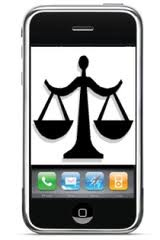Cell phone lawsuit could decide if 1st. Amendement applies to keeping your conversations private.

San Franciso, CA- If a San Francisco man wins a lawsuit filed Wednesday, keeping your cell phone conversations private could could become a First Amendment right in the state of California.
The man, Bob Offer-Westort, was arrested for pitching a tent in a public plaza during a January 2012 protest against new regulations in San Francisco that he argued would make life harder on the homeless. It was a peaceful act of civil disobedience -- but he said that when police took him back to the station house, their actions were invasive. One police officer, Offer-Westort claims, took his phone and started reading through the text messages on it.
At the time, Offer-Westort felt violated but powerless. Now he is launching a civil lawsuit that could test whether our cellphones are now so central to our lives that they are covered by the First Amendment's free speech and free association protections. The case is one of a handful at the forefront of the developing law around cell phone searches.
"We carry our cell phones everywhere we go. We have our whole life in our cell phones: where we go, who we know and what we do," said one of Offer-Westort's lawyers, Marley Degner. "And as our client shows, it's easy to get swept up in an arrest simply by attending a political protest."
California's Supreme Court has already ruled that phones carried in a pocket are fair game for police under the Fourth Amendment to the U.S. Constitution, which protects against unreasonable search and seizure. California Gov. Jerry Brown vetoed a 2011 bill that would have overturned that decision, saying the matter was best left to the courts.
Now, with Offer-Westort's lawsuit, the ACLU of Northern California is taking Brown up on that offer, arguing that when police read their client's conversations with friends and family, they violated his rights to free speech and free association.
"The compelled disclosure of information about individuals' communications or association risks chilling the exercise of these rights," the lawsuit says.
http://www.huffingtonpost.com/2013/03/22/cell-phone-privacy-bob-offer-westort-lawsuit_n_2933645.html
Court rules for EPIC, denies FBI request for delay in StingRay case:
A federal judge in Washington, DC issued an Opinion denying the FBI's motion to delay the release of records sought under the Freedom of Information Act.
Little-known StingRay surveillance tool raises concerns by judges, privacy activists:
Federal investigators in Northern California routinely used a sophisticated surveillance system to scoop up data from cellphones and other wireless devices in an effort to track criminal suspects — but failed to detail the practice to judges authorizing the probes.
The practice was disclosed Wednesday in documents obtained under the Freedom of Information Act by the American Civil Liberties Union of Northern California — in a glimpse into a technology that federal agents rarely discuss publicly.
http://www.aclu.org/files/assets/rigmaiden_-_doj_stingray_emails_declaration.pdf
The investigations used a device known as a StingRay, which simulates a cellphone tower and enables agents to collect the serial numbers of individual cellphones and then locate them. Although law enforcement officials can employ StingRays and similar devices to locate suspects, privacy groups and some judges have raised concerns that the technology is so invasive — in some cases effectively penetrating the walls of homes — that its use should require a warrant.
The issues, judges and activists say, are twofold: whether federal agents are informing courts when seeking permission to monitor suspects, and whether they are providing enough evidence to justify the use of a tool that sweeps up data not only from a suspect’s wireless device but also from those of bystanders in the vicinity.
http://www.washingtonpost.com/world/national-security/little-known-surveillance-tool-raises-concerns-by-judges-privacy-activists/2013/03/27/8b60e906-9712-11e2-97cd-3d8c1afe4f0f_story.html
EPIC v. FBI - Stingray / Cell Site Simulator:
https://epic.org/foia/fbi/stingray/default.html
Anonymized phone location data not so anonymous, researchers find:
http://www.wired.com/threatlevel/2013/03/anonymous-phone-location-data/
Law enforcement usage of the illegal "Stingray" surveillance tool is increasing.
http://massprivatei.blogspot.com/2013/02/law-enforcement-usage-of-illegal.html


